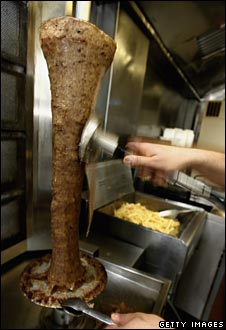|
WHO, WHAT, WHY?
The Magazine answers...
|


Sliced "elephant leg", anyone?
|
The doner is a post-pub favourite - grease and salt being the main food groups craved by the squiffy. Yet it also offers vegetables, protein and carbohydrates. Is the pitta pocket a wise dietary choice? After a few refreshing ales, the populace of this fair isle like to repair to the nearest purveyor of Mediterranean cuisine and partake of a traditional favourite - the doner kebab. The doner - whose inventor Mahmut Aygun has passed away at the ripe old age of 87 - has had much bad press of late, with reports of questionable meat and hygiene practices, and stratospheric salt and fat levels. Yet on the face of it, the doner could seem to be a healthier choice of takeaway, says Simon Langley-Evans, a professor of human nutrition at Nottingham University. "As a meal it brings together lean meat, wholemeal pitta bread, and it brings in vegetables in the form of salad. But doner kebabs tend to come smothered in dressings, which bring in a lot of fat and salt." Last year food scientists for Hampshire county council found that doner kebabs were the fattiest takeaways. One contained 140g of fat, twice the maximum daily allowance for women, and the calorific equivalent to a wine glass of cooking oil. And 60% of the kebabs tested were high in trans fat, which raises cholesterol levels.
 |
THE ANSWER
Grilled lean meat, wholemeal pitta and salad are healthy choices
But dressings high in fat or salt are not
Nor is the meat used always lean - it may have added fat or be of questionable body parts
|
Then there is the question of portion size. "These tend to be very large, and a doner kebab is usually consumed on top of a day's food as well as alcohol. It's additional food we just don't need." In common with other takeaway foods, a large doner kebab can contain up to half of one's daily calorie requirements in a single serving, he says. "People go for value for money. If they got a small portion, they would be disappointed and wouldn't go back to that kebab shop. So the takeaway industry is geared to deliver large portions." Mediterranean diet The doner kebab is claimed to have been invented 40 years ago by Mr Aygun, who left Turkey aged 16 to feed Berlin's migrant workers. Like the Earl of Sandwich before him, he realised that food on the go was at its handiest when stuffed into bread.

Strip lighting? Check. Late at night? Check. The kebab's adopted habitat
|
Kebab meat - roast lamb and spices - is traditionally served with rice and salad on a plate, and its constituent parts are drawn from the heart-healthy Mediterranean diet. But such a dish requires time, space and cutlery to eat. So in 1971 Mr Aygun tipped the meat, lettuce, tomatoes, onions and garlic dressing into a pitta pocket. And lo, the doner kebab - named after the Turkish word "dondurmek", meaning rotating roast - was born. The concept took off, and became a popular snack for anyone keen on portable eats - notably late-night revellers. While Mr Aygun's Hasir restaurant prides itself on fresh ingredients and quality meat, the doner kebab's image has drifted decidedly downmarket.
 |
WHO, WHAT, WHY?
A regular part of the BBC News Magazine, Who, What, Why? aims to answer some of the questions behind the headlines
|
The hand-carved rotating roast that has been part of Turkish cuisine for nigh on a century has become tarnished by the mass-produced "elephant legs" - minced-up cuts of indeterminate meat - rotating in greasy takeaways up and down the UK. Research by the UK's Food Standards Agency in 2006 found that 18.5% of doner takeaways posed a "significant" threat to public health, and 0.8% posed an "imminent" threat. And Trading Standards officers have found doners with up to 22% fat, and up to 12g of salt - that's two heaped teaspoons, double the recommended daily intake. "But the majority of [British] people who eat doner kebabs are somewhat inebriated and so are not best placed to make decisions about healthy eating," says Professor Langley-Evans.
|

~RS~q~RS~~RS~z~RS~19~RS~)

~RS~q~RS~~RS~z~RS~19~RS~)
Bookmark with:
What are these?